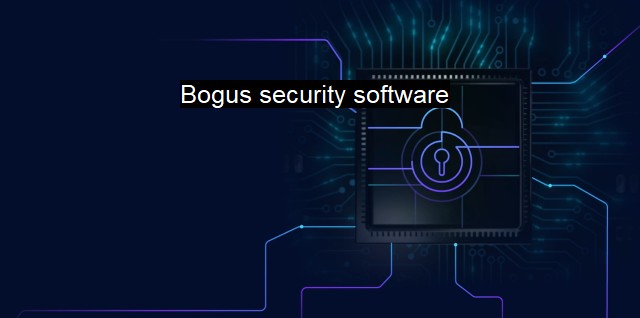What is Bogus security software?
Bogus Security Software: The Threats and Risks of Scamming Antivirus Programs
Bogus security software, also known as rogue security software, fraudulent antivirus or scareware, can be considered as one the growing threats in the realm of cybersecurity. They are dangerous tools in the hands of cyber attackers who use them to deceive users, manipulate fears regarding viruses and other malware, just to earn illicit profit.Bogus security software is a kind of malicious software (malware) that masquerades itself as legitimate security software. These are bits of code that are designed and crafted by cyber miscreants who then field the false software as an antivirus or anti-malware software, only to convince users to purchase or download it. These types of software are often paraded online through very aggressive advertising campaigns and via scare tactics.
The primary aim of the rogue software is to convince the user to make a purchase of the product. It typically does so by incessantly alerting the user to non-existent or non-hazardous risks that sound threatening. Often a virus or other threat name that sounds generic yet terrifying to the uninitiated is displayed on alerts. The rogue software then insists that the user "act immediately” to remove the "threat". A link is provided for immediate purchase and download of "updated virus definitions" or the like. If the user falls for the scam and buys the software, the alerts miraciously cease - but the user's credit card data has now been compromised, and their system likely remains porous to genuine threats.
Simultaneously, these rogue programs crucially provide no security and fail to recognize or deal with actual threats. Meanwhile, they can often deter, or undo, the operations of legitimate security programs, rendering systems defenseless against actual malware. Worse still, much false security software installs malware of its own, often by exploiting (deliberately) the vulnerabilities it 'pretends' to protect.
Many bogus security programs have a further criminally exploitative twist by harvesting sensitive information about the user & often going further to perpetrate identity theft. Information voluntarily shared by the user, banking details such as a credit card numbers gathered as part of the 'purchase', or frequent passwords on the computer's hard drive can all, and often do, fall prey to these rogue software.
Cybersecurity experts recommend genuine skepticism towards any security software or the so-called notification that makes scary claims about your computer, especially on not-commonly visited websites. If one does receive such menacing pop-up window or alert, it is wise not to directed by such alerts, and certainly to avoid clicking on the provided links and manufactured formalities, including closing the pop-up/alert window or else the red 'Esc' at the top right of the screen will enable a safe exit.
Updating one's authentic, paid-for, security software regularly, not only defends systems from viruses and other malware but also it often comes with alerts on latest rogue software and how to perceive them for what they are.
A great step toward self-protection is regular user education. Knowledge of best practices in online activities, paying attention to credible sources about new threats, keeping systems and software updated and patched, using only trusted security vendors and running regular security check-ups will all contribute towards minimizing the chances of becoming victims of such scams.
Bogus security software is a growing cybersecurity threat that uses manipulation and fear to trick users into installing hazardous software or revealing personal details. Indispensable approaches to avoid them include maintaining an updated legitimate security software, being aware of manipulative alerts & overall vigilant about any unusual behavior online.

Bogus security software FAQs
What is bogus security software?
Bogus security software is a type of scam in the cybersecurity world in which fake antivirus software appears to provide security services but actually poses a threat to a computer's security.How does bogus security software work?
Bogus security software tricks users into downloading or purchasing it, and once installed, it shows fake alerts that pretend to detect malware on the system. The software then offers to remove the malware if the user pays for the full version, which is not only a waste of money but also a security risk.How to avoid falling for bogus security software scams?
To avoid falling for bogus security software scams, users should only download antivirus software from trusted sources and avoid clicking on pop-ups or ads that claim to detect malware on the system. It is also important to keep the antivirus software updated and to perform regular system scans.What are the risks of using bogus security software?
Using bogus security software can pose various risks to the user's computer and personal information, including installing dangerous malware, stealing sensitive information, and even causing system crashes or permanent damage to the computer. Therefore, it is important to be aware of this scam and take appropriate measures to avoid it.| | A | | | B | | | C | | | D | | | E | | | F | | | G | | | H | | | I | | | J | | | K | | | L | | | M | |
| | N | | | O | | | P | | | Q | | | R | | | S | | | T | | | U | | | V | | | W | | | X | | | Y | | | Z | |
| | 1 | | | 2 | | | 3 | | | 4 | | | 7 | | | 8 | | |||||||